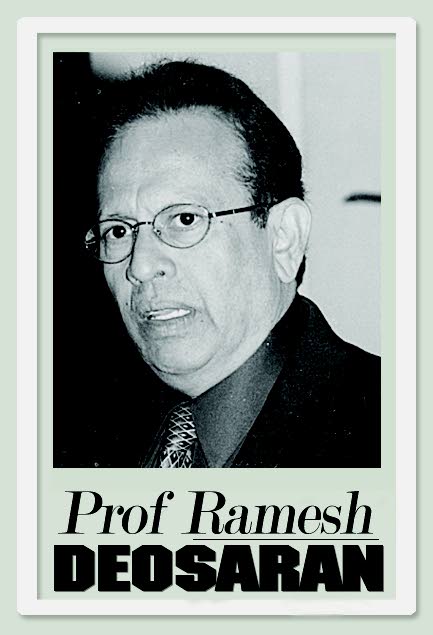Cows, ducks, thieves

Prof Ramesh Deosaran
Thief. This is simply described as “a person who steals, especially secretly,” (Concise Oxford). For thieves, Trinidad seems to be a paradise. So much bold-faced “teefing” – night and day – that the dictionary words “in secret” should be deleted. Stealing coconuts, fowl, fruits, vegetables, animals, even breaking in and toting away agricultural equipment like wheel-barrows, fertilisers, rakes and hoes – everything stolen from farmers and agriculturalists. Talk to them, as I have done, and you will hear. Many have stopped planting. Grow more food, yes, but it seems as fast as it grows, thieves reap it.
There are big-time thieves trucking away large amounts of corn, coconuts, bananas, cabbage, tomatoes, etc. And small-time ones – trespassing into back-yards for mangoes, breadfruit, etc. For example, a newspaper headline stated: Fig thief in court, (Newsday, June 12). Another headline said: $12,000 fine for mango thieves (Guardian, July 25). Another headline: Mango thief jailed for two months (Express, April 28). These are small-time jail-birds. The bigger fishes, like those with truckloads of coconuts, seem harder to catch.
There are, of course, other types of thieving like robbery with violence, larceny of vehicles, etc. The murder rate and gang-wars are very troubling, yes, but this praedial larceny epidemic, at ground level, and in true community policing psychology, has grown extremely irritating, grievous and expensive to our farmers. Bring quick relief here and both agriculture and public confidence will grow.
As a kickstart, let the Farmers’ Association, the Agricultural Society, Ministry of Agriculture, regional corporations, emerging “action-man” Agriculture Minister Clarence Rambharat , and of course, Mr Gary Griffith gather to attack the bold-faced thieves with full force. This joint effort does not require international help as much as it requires localised operational focus, managed benchmarking and accountability. More manpower, maybe, but certainly strategic planning. I felt obliged to return to this upsetting subject when I came across a recent news clipping in my over-flowing file about a woman crying for her stolen cows, her tears accompanied by the too-often complaint about police response. Secondly, I refer again to acting ACP McDonald Jacob’s instruction to officers at the over 70 police stations across the country. His was a response to Mr Ram Raj’s complaint of 26 stolen ducks and non-responses by police at two police stations. Agriculturalists, especially, are usually law-abiding people of patience and hard work. They need help and protection.
ASP Jacob said: “When a report of praedial larceny is made to the police station, the officers are supposed to investigate just as they would any other crime reported to them” (Newsday, June 28). That is, whether at police stations in Mayaro, San Juan, Toco or Caroni. Jacob dutifully added: “The crime and incident forms are to be filled out and officers should be dispatched to the crime scene…The Praedial Larceny Squad may become involved later.” The commissioner can also precept farmers.
You see, the Larceny Squad is one of those in-between police types – between the Ministry of Agriculture and the Police Commissioner – now obviously in need of tidying up. The Praedial Larceny Act (No 12 0f 1963 as amended) states: “Any constable or authorised person may, without warrant, stop and search any person who he has reasonable cause to suspect is carrying agricultural produce or livestock which has been unlawfully obtained or is in control of any heap, stall or other collection of agricultural produce of livestock which has been unlawfully obtained (Section 3B).
People found guilty are liable to fines of $5,000 - $20,000 or four years jail. The Commissioner of Police assigns constables (officers) to the squad. The act defines a constable as “any member of the Police Service, any member of the Municipal Police Service and any member of the supplemental bodies of police established under the Supplemental Police Act and the Special Reserve Police Act.” This definition is one reason for the Police Manpower Audit Report asking that reform of the TTPS should also include a review of these other supplemental officers to provide the country with a well-co-ordinated and effective public safety system.
All officers – constable, praedial larceny squad officer, SRP, municipal police – should properly respond to citizens’ complaints of praedial larceny. This is the kind of total policing the public wants. Hence ASP Jacob’s wise advice.

Comments
"Cows, ducks, thieves"